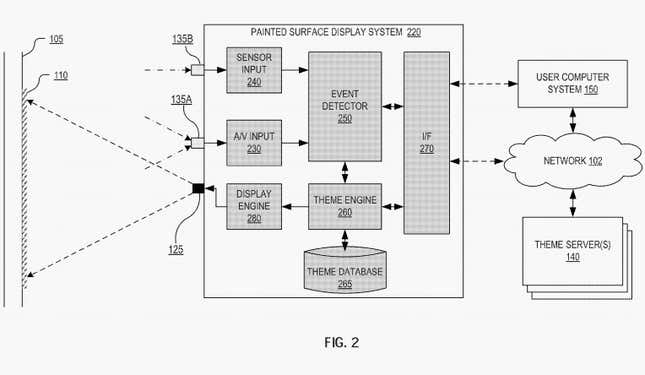The writers of Back to the Future Part II in 1989 got many of their predictions about life in 2015 right. We have tablets and video calling, and we’re even getting Nike Air Mags with power laces (though we’re still waiting for hover boards and flying cars).
One of the more fanciful pieces of tech in the film was the window shade that turned into a screen displaying scenic views (an idea similar to the dining room wall in another futuristic classic from the same era, 1990’s Total Recall).
No such device is on the market now, but it seems that Google is working on rectifying this.

In a patent awarded to Google today, the company outlines a projection system that can display images on a wall painted with photo-reactive paint. Google’s idea would essentially turn any wall in a house into a massive e-book screen.
The projector would emit a beam of light or a laser that would produce what the patent calls a “theme.” When the light or laser hits the wall, the photo-reactive paint would change from being whatever color it was painted into something rather similar to a computer wallpaper or screensaver. The photo-reactive wall would work like e-ink, meaning that the projected image would stay on the wall until a new image is projected.
The patent suggests a range of different themes that could be displayed, including one that mimics the weather outdoors; holiday-specific themes (such as adding cobwebs and spiders to the wall for Halloween); or one that updates with scores and images from sports matches.
The patent suggests that the proposed technology would be able to update the projected images often enough to support videos (rather than just still images), meaning the McFlys’ window television could one day become a reality. The patent also says that any surface could be coated in transparent photo-reactive paint, meaning you could theoretically turn an entire house into a television, if you wanted to feel like you lived in a sports bar or art installation.
There’s certainly no guarantee that Google will be turning this patent into a product. Google responded to a request for comment with the following statement: “We hold patents on a variety of ideas—some of those ideas later mature into real products or services, some don’t. Prospective product announcements should not necessarily be inferred from our patents.”
But still, the patent awarded today paints an interesting picture of Google’s thoughts on the future of media consumption. The patent says the projector images would have to be controlled by a computer or a cell phone, meaning the system could actually be the logical extension of the company’s Chromecast streaming device.
The image above was taken by Nicholas A. Tonelli and shared under a Creative Commons license on Flickr.
